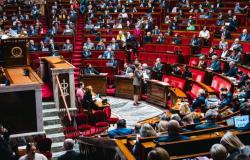The Australian Parliament passed a law on Thursday imposing a strict ban on access to social networks for those under 16 years of age. This text, supported by the main parties and approved by both chambers, aims to force platforms like X, TikTok, Instagram or Facebook to take measures to prevent young children and adolescents from creating accounts. In the event of non-compliance, financial sanctions which may exceed 30 million euros will be applied.
Prime Minister Anthony Albanese, a staunch defender of this measure, justified this initiative by criticizing social networks as being “a platform for social pressure, a source of anxiety, a channel for scammers and, worst of all, a tool for online predators. He encouraged young Australians to ditch their phones in favor of sporting activities. “Let the children be on the football pitches, the cricket pitches, the tennis pitches or the swimming pool,” he said.
The platforms are up against this decision
This law has sparked strong criticism from certain platforms and elected officials. Meta, parent company of Facebook and Instagram, regretted that “what the sector is already doing to ensure age-appropriate experiences” had not been taken into account. For her part, Senator Sarah Hanson-Young described social media algorithms as “dangerous” while doubting the effectiveness of the law. “It will not make social networks safer for young people,” she said, adding that she was “devastated” to see young people “addicted to these algorithms”.
On a technical level, many experts doubt the feasibility of this ban. The text remains unclear on its terms of application and could only have symbolic significance. Full implementation of the law will take at least a year, while regulators work out the details. Amendments have also excluded the obligation for users to provide an identity document to prove their age.
Some applications were spared
The law should spare certain platforms like WhatsApp and YouTube, considered essential for adolescents for their homework. At the same time, initiatives aimed at teaching children to think “critically” about what they see online, inspired by educational models like that of Finland, could be put in place.
Find our file on social networks
While the Australian ban is one of the strictest in the world, its practical implementation and long-term impact remain uncertain. Despite the criticism, Anthony Albanese's government hopes that this law will mark a turning point in the regulation of social networks in the face of the risks they pose for young people.






